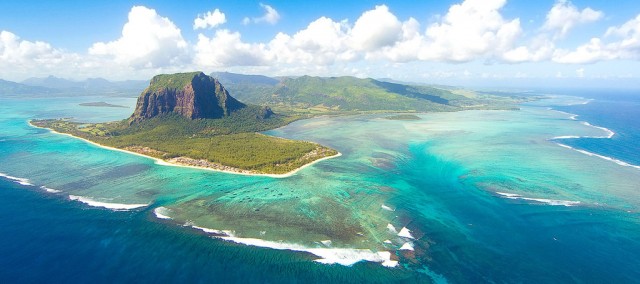Mauritius
The small island nation of Mauritius lies about 500 miles east of MADAGASCAR in the Indian Ocean. It consists of Mauritius and several small islands off to the north and east. Once heavily dependent on the production of sugar, Mauritius has developed a strong economy that includes a variety of manufacturing industries.
Of volcanic origin, the island of Mauritius measures only 38 by 29 miles. Its high central plateau is broken by gorges and small rivers and by peaks that remain from an ancient volcanic crater. Mauritius has a subtropical climate with fairly even temperatures throughout the year. The central plateau receives more rain per year than other areas. Sugar, first introduced to Mauritius in the 1600s, remains the island's leading export. Since the 1970s the country has diversified its economy by establishing the Mauritius Export Processing Zone, an industrial center focusing on producing goods for export. Among the most important manufactured goods are textiles and clothing. The tourist industry is also growing.

The first people to reach Mauritius were probably seafarers from the Arabian peninsula. (The island had no indigenous population.) The Portuguese explored the area in the early 1500s. Between 1638 and 1710, the Dutch made several attempts to colonize the island, which they named Mauritius. However, it was the French who established the first permanent colony there in 1721. Renamed Ile de France, Mauritius remained a French colony until 1810 and was used as a naval base to defend French interests in India. Its main port and capital city, Port Louis, became a major commercial center.
Located along the shipping routes between Europe and Asia, the island had great strategic importance and attracted the interest of other nations, including Britain. In 1810 the British captured the island and reinstated the name Mauritius. France formally ceded the island to Britain in 1814. Mauritius remained a British colony until it gained independence in 1968. Originally a constitutional monarchy, with Queen Elizabeth II as head of state, Mauritius became a republic with an elected president in 1992.
Mauritian society and culture are very diverse. Many of the people are either Creole or of French ancestry. Those of Indian descent make up the single largest group. Many Indians came to Mauritius in the 1800s as indentured laborers—people who agree to work in another country for a specific length of time in return for transportation. Mauritius also has a sizable Chinese population. The three main religions on the island are Hinduism, Christianity, and Islam. The official language is English, but French, Hindi, and other languages are widely spoken. (See also Colonialism in Africa, Indian Communities.)